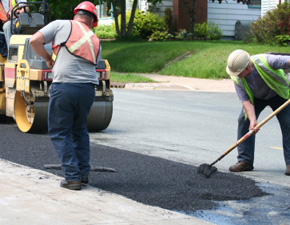Transportation & Infrastructure

Sen. Bernie Sanders believes we must make significant investments in our nation's roads, bridges and transit systems for the United States to remain economically competitive. As a member of the Transportation and Infrastructure Subcommittee of the Senate Committee on Environment and Public Works, Sen. Sanders helped write the first new surface transportation bill since 2005, which will begin to address the dire condition of our nation's deteriorating infrastructure. Sen. Sanders understands that investing in infrastructure is also one of the best ways to put millions of Americans back to work in decent paying jobs that cannot be outsourced or off-shored. Sen. Sanders believes we must reorder our national priorities and invest in other physical infrastructure as well, including energy, water and wastewater, and broadband, and also in social infrastructure such as schools, equipment for first responders and health care professionals.
As a member of the Transportation and Infrastructure Subcommittee of the Senate Committee on Environment and Public Works, Sen. Sanders helped write the first new surface transportation bill to pass since 2005. This legislation, the Moving Ahead for Progress in the 21st Century - or MAP-21 - was signed into law by President Obama in July, 2012.
Sen. Sanders strongly supported this legislation, which will provide states with the financial resources to begin addressing our nation's deteriorating transportation infrastructure. One-third of America's major roads are in poor or mediocre condition, and one of every four bridges in the U.S. is either structurally deficient or functionally obsolete. Sen. Sanders sees the need for investment in towns throughout Vermont - which, according to a recent report, unhappily has the highest percentage of rural roads in need of repair in the nation.
The transportation bill also increases funding for public transit - especially for small and rural states - which will provide additional transportation options and cut down on greenhouse gases that contribute to global warming. Lastly, the bill also includes much-needed reforms to cut down on bureaucratic red tape and accelerate project delivery.
Sen. Sanders knows that investing in infrastructure is also a proven way to create jobs: for every billion dollars of federal funds spent, nearly 35,000 jobs are saved or created. At a time when the country remains in the grip of the worst economic downturn since the Great Depression, when the official unemployment rate is hovering at 8.2 percent and underemployment exceeds 15 percent, Sen. Sanders believes that we desperately need these good-paying jobs in the construction, engineering, equipment and materials sectors. Rebuilding and improving the nation's infrastructure positions our economy to compete in the 21st century - and would also create, in the present, badly needed new jobs.
In addition to saving more than 1.8 million jobs, the transportation bill will create up to 1 million new jobs by significantly expanding an infrastructure investment financing program known as TIFIA. Working closely with EPW Chairman Barbara Boxer, Sen. Sanders secured changes to the program that will benefit rural areas such as those in Vermont.
Improving our roads, bridges, ports and rail systems not only creates jobs, it enables American business to compete in the global economy. Throughout our nation's history, America has led the way on transportation innovations: a network of canals, a transcontinental railroad, the interstate highway system and a robust network of regional airports. Dams constructed in the Tennessee Valley and the American West created new energy sources and changed the shape of American agriculture. These advances - which have kept Americans connected and the economy humming - have been the envy of the world. Sadly, that is no longer the case. Today, the U.S. invests just 2.4 percent of GDP on infrastructure, while Europe invests twice that amount and China invests almost 9 percent of its GDP annually.
So, while the transportation bill is a very important step in the right direction, Sen. Sanders recognizes that it is quite modest compared to the level of investment our nation needs. The American Society of Civil Engineers estimated that we must invest $800 billion over the next five years simply to get our roads, bridges and transit systems to a "passable" condition - which works out to three times the annual rate of spending under this legislation.
There is a strong link between transportation and infrastructure projects, on the one hand, and reducing global climate change on the other. Sen. Sanders supports mass transit, including in rural areas, and he advocates for bike and pedestrian alternatives to relying entirely on cars. He is an advocate for moving toward hybrid cars and plug-in electric vehicles and for increased CAFE (auto mileage per gallon) standards.
A strong supporter of the American Recovery and Reconstruction Act (ARRA), he helped facilitate the plan that provides funding to bring high speed wireless broadband to every town in Vermont. The legislation, in addition, provided $69 million, matched by the state's utilities, to build the nation's first state-wide system of smart meters. This will enable Vermont to be the first state to have a fully-functional smart grid, allowing small and large scale sustainable energy projects to supply electricity to Vermonters, and enabling new levels of energy efficiency for homeowners and businesses.
Sen. Sanders believes we still have much work to do to build an America that can meet the challenges of the 21st century - to make our nation competitive, to meet people's needs and to address the crisis of climate change. He will continue to lead the effort to reinvest in America, to create jobs here at home and to rebuild our infrastructure.




